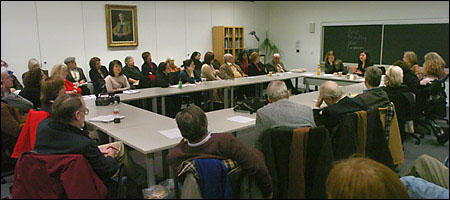Reporting across the Israeli-Palestinian divide
Journalists from two sides of issue find surprising areas of agreement
They are very different.
And yet they are very much the same.
Journalists Taghreed Zuhair El-Khodary, a Palestinian, and Zippi Brand, an Israeli, are on opposite sides of a dispute widely seen as one of the longest-running and most intractable in the world.
Yet these two women, Nieman Fellows at Harvard this year, share not only similar experiences of living with the chronic violence of the Middle East, but also an assessment that the surprise win by Hamas in the Palestinian elections could lead to progress in the Middle East peace process.
El-Khodary and Brand presented a panel Tuesday afternoon (Feb. 7), “Reporting Across the Israel-Palestine Divide,” at the Weatherhead Center for International Affairs.
El-Khodary was born in Gaza City and has worked there as the Gaza television correspondent for Al Hayat-LBC, the joint news venture run by the London-based pan-Arab daily and the Lebanese public broadcaster.
“I really hated covering the assassination attacks,” she said, describing the continual strain, professional and personal, of covering suicide bombings, assassinations, and the destruction of houses in the years preceding the Israeli pullout from Gaza last summer.
Describing the challenge of putting together a complete news report after an explosion, she said, “You have to struggle to get the focus.” She continued, her voice tight with emotion: “You become addicted, you become like a machine.”
“Those are exactly the same experiences I’ve had as an Israeli journalist – waiting for the terrorist attacks in the night,” said Brand, a journalist and documentary filmmaker, when she had the floor. She described how, after a bomb went off, she would immediately call all her relatives to check on them. “Every one of us felt themselves a target.”
She said she’s so used to having to open her bag for a security inspection when she stops in at a café that it feels strange not to have to do it in Cambridge.

Similarly, El-Khodary said she is so used to flinching at the sounds of F-16 jets flying by or Apache helicopters hovering that even after five months in the Boston area, she still reacts to the sound of aircraft overhead.
El-Khodary suggested that it was Israeli military might – both in retaliatory assassination attacks and in more mundane actions – that led to the Hamas electoral victory. “I’ve seen the young Israeli soldiers humiliate fathers, humiliate poor people,” she asserted. In fact, El-Khodary said, the whole Palestinian Authority seemed humiliated by the Israelis, whereas Hamas – disciplined, and considered free of corruption – looked powerful by comparison with Fatah. “There are reasons why Hamas is so popular,” she said.
Brand also described Hamas’ victory in relatively positive terms. As a legitimate elected government, “they have an address; they have accountability.” For much of the period after 1967, Israel hasn’t really had a negotiating partner, Brand said. “We have to go back to 1967. As we occupied the territories, no one wanted to negotiate with Israel. Israel was not an entity for them.” The Hamas win settles that issue, Brand suggested.
Israel faces elections March 28, and Brand predicted a “vast majority” for acting Prime Minister Ehud Olmert’s Kadima and Labor. She also said that in the past few years, a consensus has formed for “almost complete withdrawal from the West Bank.”
The two-hour session, with questions from the audience, was not without some underlying tensions between the panelists, and at points, moderator Donna Hicks intervened to keep the discussion focused on the journalistic issues rather than the larger political questions.
Both panelists sounded upbeat on the relatively open and keenly competitive media universe they work in. “There is nothing hidden anymore,” said El-Khodary. “The satellites are everywhere,” providing broadcast feeds more easily than before. “I’m so glad Al-Jazeera is coming out with an English channel.”
Both have had comparable experiences of living in very close proximity to “others” they never knew until they got to meet them as journalists. Brand had never been to the West Bank until she traveled there as a journalist. As she was growing up in Israel, Gaza and the West Bank had never been places she’d visited on family trips or with friends. “We didn’t think we should be there.” Such isolation is not uncommon, she suggested. “People don’t know each other … even if they live only half an hour away.”
El-Khodary grew up in Gaza City but had never visited a Palestinian refugee camp until after her journalism studies at the American University in Cairo. She had grown up under Israeli occupation with no local Palestinian media; her own professional career began during the period of the Oslo peace process. “I wanted to find out what these camps are. … I wanted to dig, and I think journalism helped me big-time.”




